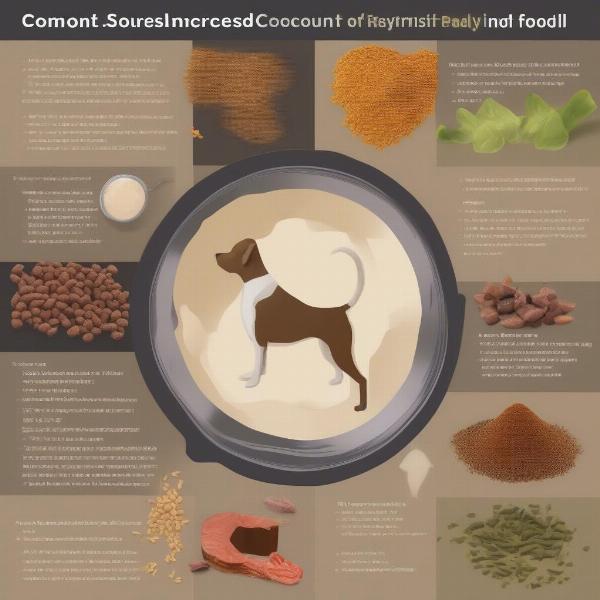Myristin is a common ingredient in many dog foods and treats. While it sounds complex, understanding its role in your dog’s diet is important. This article will explore what myristin is, its potential benefits and drawbacks, and answer some common questions dog owners have about this fatty acid.
Understanding Myristin: A Fatty Acid in Your Dog’s Food
Myristin, also known as tetradecanoic acid, is a saturated fatty acid found in various animal and plant fats. It’s present in coconut oil, palm kernel oil, butter, and even some meat products. In dog food, it often comes from these sources and contributes to the overall fat content. While fat is an essential part of a dog’s diet, providing energy and supporting cell function, not all fats are created equal. It’s crucial to understand the role myristin plays in your dog’s overall health.
 Myristin sources in dog food
Myristin sources in dog food
Potential Benefits and Drawbacks of Myristin for Dogs
Like other saturated fats, myristin can provide a concentrated source of energy for dogs. It also aids in the absorption of fat-soluble vitamins like A, D, E, and K. However, it’s important to remember that moderation is key. While some myristin is acceptable in a balanced diet, excessive amounts can contribute to weight gain and potentially increase the risk of certain health issues, such as pancreatitis in susceptible dogs.
How Much Myristin is Too Much for a Dog?
There’s no single magic number for the ideal amount of myristin in a dog’s diet. It depends on factors like breed, size, activity level, and overall health. It’s always best to consult with your veterinarian to determine the appropriate fat content, including myristin, for your individual dog’s needs. They can help you analyze your dog’s current food and make recommendations if necessary.
Is Myristin in Dog Food Harmful?
Myristin itself isn’t inherently harmful in moderate amounts. The concern arises when it makes up a significant portion of the overall fat content, contributing to an imbalance in the dog’s diet. A balanced diet should include a variety of healthy fats, not just saturated fats like myristin.
What to Look for on Dog Food Labels Regarding Myristin
Dog food labels typically list the total fat content but not the specific breakdown of individual fatty acids like myristin. However, looking at the ingredient list can give you some clues. If ingredients like coconut oil or palm kernel oil are high on the list, the food likely contains a higher amount of myristin.
Conclusion: A Balanced Approach to Fat and Myristin in Your Dog’s Diet
Myristin, like any other nutrient, plays a role in your dog’s overall health. While it offers some benefits, it’s essential to feed it in moderation as part of a balanced diet. Consulting with your veterinarian is the best way to ensure your dog is getting the right nutrients, including the appropriate types and amounts of fat.
FAQ:
- What is myristin? Myristin is a saturated fatty acid found in some animal and plant fats.
- Is myristin bad for dogs? Myristin is not inherently bad for dogs in moderation. Excessive amounts can contribute to weight gain and other potential health problems.
- How can I tell how much myristin is in my dog’s food? Dog food labels don’t usually specify myristin content, but you can look for ingredients like coconut oil or palm kernel oil, which are sources of myristin.
- Should I avoid dog foods containing myristin? Not necessarily. Focus on choosing a balanced diet with the appropriate overall fat content, as recommended by your veterinarian.
- What are the benefits of myristin for dogs? Myristin provides a concentrated source of energy and aids in the absorption of fat-soluble vitamins.
- Can myristin cause pancreatitis in dogs? While not a direct cause, excessive saturated fat intake, including myristin, can be a contributing factor to pancreatitis in susceptible dogs.
- What should I do if I’m concerned about the amount of myristin in my dog’s food? Consult with your veterinarian for personalized advice.
ILM Dog is a dedicated resource for dog owners worldwide, providing expert advice on all aspects of dog care and wellbeing. From breed selection and puppy care to senior dog health and training tips, we offer practical, reliable information to help you give your furry friend the best possible life. Our expertise covers nutrition, behavior, grooming, and product recommendations to ensure your dog thrives. For personalized advice or further information, contact us at [email protected] or +44 20-3965-8624. Visit ILM Dog today for a wealth of information on dog care.